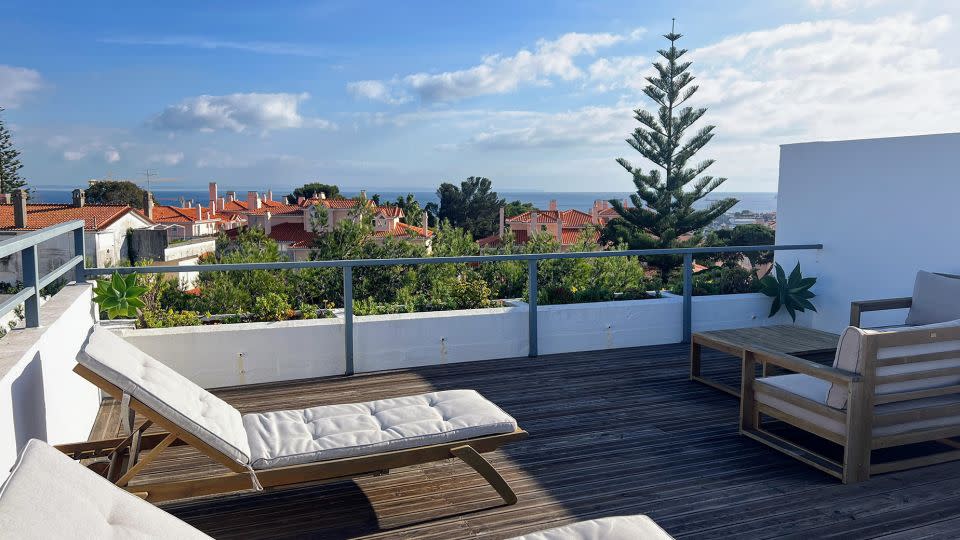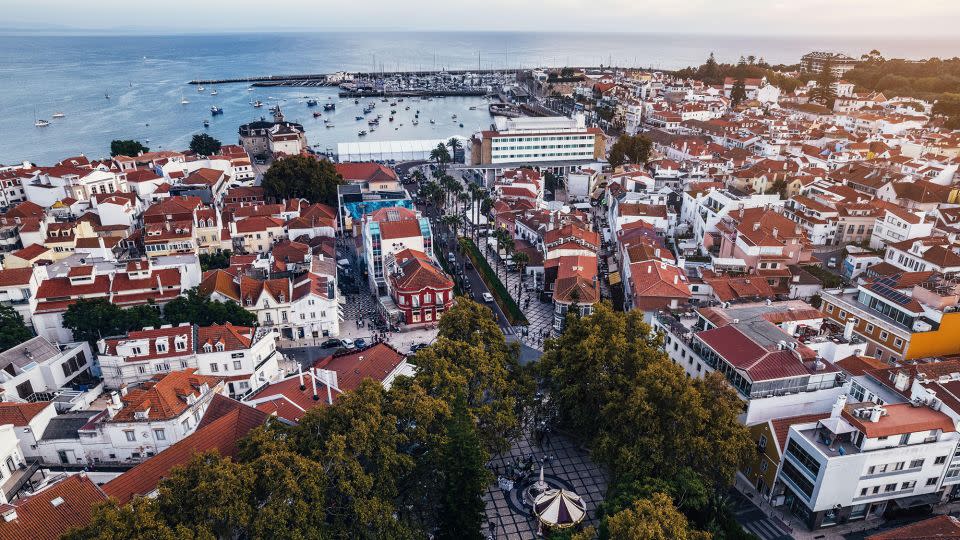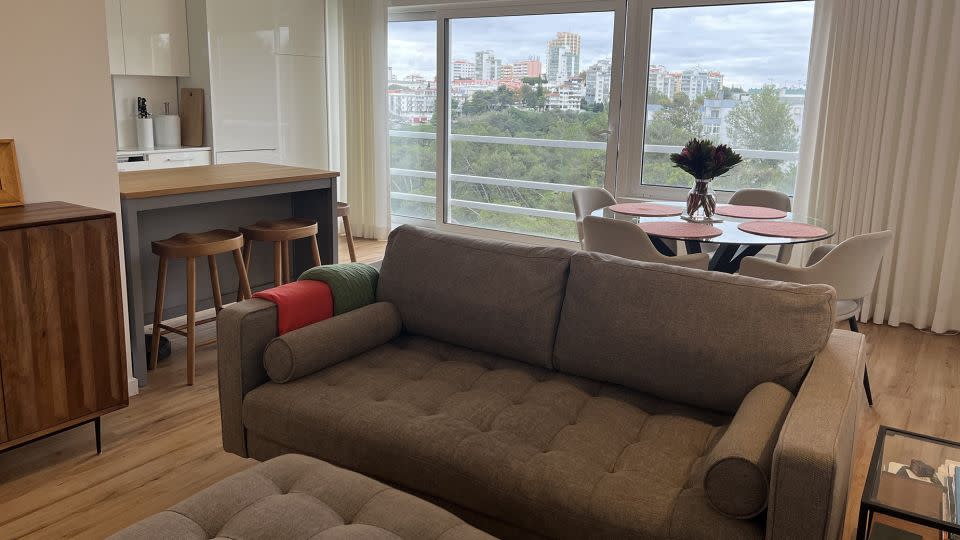Why this American woman has ditched the US for Portugal
Moving to a foreign country can be a scary decision. Particularly if it’s a country you’ve never even visited.
In 2021, Katie Meyer, a global hospitality communications professional from California, chose to do just that.
Meyer, who had previously lived and worked in London before returning to the US, relocated to Portugal during the Covid-19 pandemic, settling in the idyllic seaside resort of Cascais, close to Lisbon.
“My dream was to someday to return to Europe,” Meyer, 66, tells CNN. “Once remote work became standard and I sold my real estate in the US. I knew that relocation to Europe was a ‘now or never’ proposition.”
New chapter

Her personal and professional travels had taken her to many countries in Europe throughout the years, but never Portugal.
While the sunny Mediterranean climate and Portugal’s laid-back vibe were part of the allure, Meyer was ready for a new chapter in her life.
Safety, quality of life, affordable medical care, and a relatively simple path to permanent residency and citizenship, were high on her list of priorities for her future country of residence, and Lisbon ticked all of her boxes.
Signs of the pandemic were still very evident when Meyer arrived in the Portuguese capital with five suitcases in tow in August 2021.
“Few hotels and restaurants open, a fraction of the number of usual tourists, mask-wearing the norm, I felt like I had Lisbon to myself,” she says.
Meyer rented an apartment for three months in Lisbon at first. But after exploring the area, she fell in love with the charms of nearby Cascais, a former fishing village that has been luring many expats recently.
She was struck by Cascais’ unplugged and somewhat sleepy feel, which was something she wasn’t accustomed to, and the fact that locals didn’t seem to use mobile phones at the market or cafes.
“Here, time stands still, and people relish time together,” she says. “Things take longer. In place of any sense of urgency you find a happier, more laid-back lifestyle.
“But one that can be very frustrating to Americans addicted to frenetic beats and trapped in the rat race.”
She says she was taken aback by the genuineness of the Portuguese people, their pride and joy in learning that an expat had chosen their country as a new home, and their willingness to help when she was struggling to communicate.
“Portuguese is a very difficult language to learn, but they are always willing to help with pronunciations and usage,” she says. “It is very much a welcoming culture.”
‘Welcoming culture’

Later that year, Meyer bought a 95-square-meter, two-bedroom, split-level apartment with a roof terrace in a quiet neighborhood, close to cafés and cultural attractions.
Situated on a hill above the center of town, it offers striking views stretching from Cascais Bay and the ocean to the famous mountains and palaces of Sintra.
The purchase price was 595,000 euros (around $651,000). Even though Portugal saw an overall property price increase of 13.8% in 2021, with prices continuing to rise in the years since then, Meyer estimates that an apartment in a similar spot in California would have cost her at least triple.
Fortunately, Meyer was able to benefit from Portugal’s “golden visa” system, a five-year residence by investment program aimed at non-EU nationals, which is no longer available for real estate purchases.
To qualify, applicants were required to make a real estate purchase of a minimum of 500,000 euros ($547,000.)
The golden visa grants her visa-free travel through Europe’s Schengen Area. She also has the option to apply for Portuguese citizenship after holding a golden visa for five years, according to a recently amended law aimed at speeding up procedures.
But for Meyer, one of the cons to moving to a destination with such a slower-paced lifestyle has been getting through red tape, and she faced a wait of around two years to obtain her residency due to the Portugal’s previous long approval process.
“Word of mouth from others who have been through it reigns supreme,” she says. “And my advice would be to find a good attorney.”
Meyer says that Cascais’ strong sense of community played a part in her decision to build her new life there.
“People are very social and family-oriented,” she says. “On weekends I meet friends at the popular mercado, where, in addition to a farmers’ market, butchers, cheese and fishmongers, crafts, stands with clothing and household goods for sale, you can socialize and just watch the world go by.”
Savoring a creamy pastel de nata (egg or custard tarts) or a tosta mista (a grilled sandwich) at one of the local pastelaria shops is also a popular pastime here.
According to Meyer, the quality and speed of service in restaurants and hotels is slower than in the US, and deliveries and home repairs are also likely to take longer.
Culture clashes

“On the upside, a restaurant server would never, ever present a bill without a customer asking for it,” she adds.
“That would be considered rude, even with a line of customers waiting for a table. And you won’t see people eating or drinking on the go, as you would in the US.”
Meyer has noticed that the absence of a tipping culture in Portugal is something that Americans find difficult to grasp.
“A small tip is always appreciated for good service and overall experience,” she adds. “But not mandatory. Americans over-tipping can even be considered rather vulgar in some circles.”
She’s picked up some local habits, like forsaking a clothes dryer, considered “the Portuguese way.”
However, Meyer hasn’t been able to give up air-conditioning – a 2022 study by real estate platform Idealista found that only one in four properties on the market in Portugal had air conditioning – and has a unit installed at her home.
Adapting to the local climate has also meant learning to deal with the high coastal humidity and the propensity for mold in winter.
“Due to different building standards than those we are accustomed to in the US, dampness and mold is common,” says Meyer.
“I’ve learned to live with various dehumidifying devices and the frequent airing out of my apartment during winter months. Just part of the new routine.”
Meyer’s also had to adapt to the intricately-designed cobblestones on the sidewalks of Portugal – calcada portuguesa – which can be “beautiful to the eye but treacherous to the body.”
“I slipped and fell on these slick stones several times when I first arrived, and quickly learned that this is simply a rite of passage,” she says, adding that she now wears sneakers to tackle them. “In Portugal, it’s function over style in the shoe department.”
She’s also had to get used to the Portuguese queuing systems. The phrase, “take a number,” has all-new meaning in Portugal, says Meyer.
“To get served at post offices, hospitals and pharmacies requires you go to a machine for a senha, a piece of paper containing a code indicating your place in line,” she explains.
“You may proceed to a desk only once your number is illuminated on a screen and called.”
However, Meyers feels that the affordable cost of living in Portugal outweighs any challenges, even though prices have risen in the years since she’s been there.
“When I arrived an Uber ride within the greater Cascais area started at 1.50 euros (around $1.64),” she says. “Today that is closer to 3.50 euros or 4 euros (about $4.38.)
“Recently, I had friends tell me that a round trip Uber ride they took in NYC – from Lower Manhattan to the Upper West Side – was $100, including tip, of course. Sticker shock is common for anyone living in Portugal and returning to the US.”
Back in late 2021, Meyer says that lunch for two (a fish, steak or stew main, vegetable and potatoes, two glasses of wine, bread and bottled water) would cost her 16 euros (around $17.50.) More recently, the price was 22 euros (around $24,) which she still considers to be a relative bargain.
Although Meyer has adapted well, she says she’s still trying to fully absorb the Cascais vibe and feel like a local.
“When living outside of the US, I consider myself first and foremost a foreigner,” she says.
“I know that I must adapt to a new and different culture, not vice versa. Embracing that mindset is fundamental to living abroad.”
Meyer gets homesick from time to time, but says she has no plans to return to the US, and wouldn’t swap her new life for anything.
“I miss my friends and family in the US, but living in a safe, peaceful, affordable and eye-opening environment is an indisputable trade-off,” she says.
“Portugal is a pretty wonderful travel destination – and I’ve had more US visitors these past two years than I probably would have had time to see if I were still living in the US.”
For more CNN news and newsletters create an account at CNN.com


